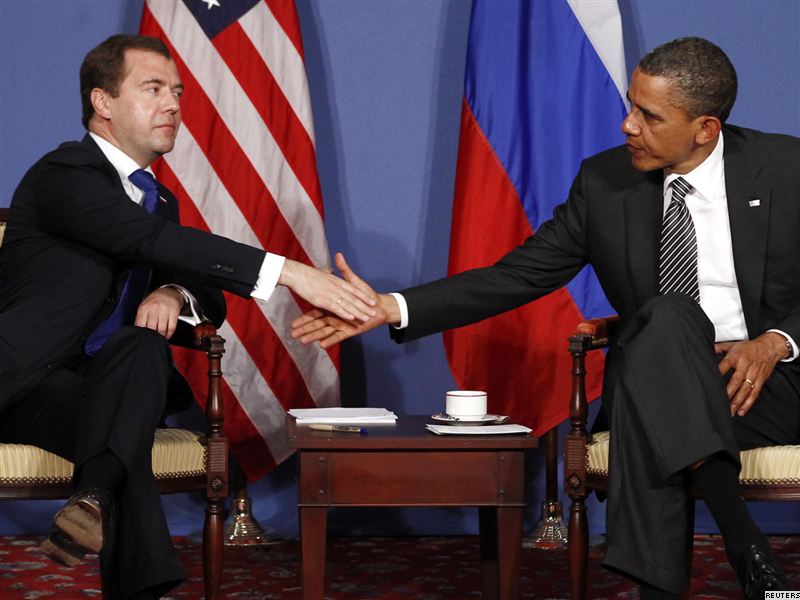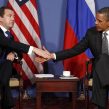
US Move Against Doku Umarov Will Have Little Impact on Militant Activities
Publication: Eurasia Daily Monitor Volume: 8 Issue: 105
By:

May 2011 ended with a loud statement made by US President Barack Obama in Paris, in which he declared the leader of the North Caucasus-based armed resistance, Doku Umarov, a terrorist, a move bound to please Russian President Dmitry Medvedev. The US president further pledged $5 million for information on Umarov’s whereabouts. The US government did not pay out any rewards for information on the whereabouts of Osama bin Laden (www.reporterus.com/archives/16132) or Ratko Mladic (https://rus.ruvr.ru/2011/05/28/50933283.html). The chances of anyone getting the reward for locating Umarov are almost non-existent as well.
This US statement equating Doku Umarov with other extremely dangerous international terrorists could be nothing more than an opportunity to bargain with Russia on the issue of missile defense in Eastern Europe. This decision was meant to lessen the misfortunes of the Russian president in the eyes of his country’s citizens in the context of his obviously fruitless meeting at the G8, held in Deauville, France on May 26. For the United States, this step implies nothing new nor does it bind the United States to anything. If anything, it simply permits the US to continue ignoring the issue of the North Caucasus.
To put it mildly, the previous steps by the US State Department to block Umarov’s foreign bank accounts and declare his Caucasus Emirate as a terrorist organization (www.voanews.com/russian/news/DOKUku-Umarov-2010-06-25-97180859.html) failed to have any impact on his operations in the North Caucasus region. Umarov did not have any such accounts in the past, does not have them now and is unlikely to have them in the future. As for the inclusion of the Caucasus Emirate in the general list of terrorists, raising the organization’s profile from a regional one to a higher level, again does not change anything. Doku Umarov’s authority, however, seems to have grown considerably in the eyes of the Caucasus Emirate’s adherents.
Meanwhile, Umarov, through his decrees #25 and #26 issued on May 9, appointed a new leader of Dagestan’s Sharia Jamaat, replacing Emir Khasan (Israpila Validzhanov), who was killed on April 17, with Emir Salikh (Ibragimkhalil Daudov). As a Naib (deputy), Emir Salikh was second in line for this position. The first Naib, Emir Adam (Adam Guseynov), died at the beginning of 2011.
Emir Salikh was born in 1960 in the village of Gubden in Dagestan’s Karabudakhkent district. Previously, Emir Salikh headed a central sector of the Dagestani theater of operations. His family lived for a long time in the Stavropol region, where the Dagestani diaspora grows larger each year as a result of settlements in Stavropol’s border areas. In 2007, the family resettled in Gubden, where the strength of Salafis is on average much higher than in other areas of Dagestan. Emir Salikh joined the resistance movement together with his three sons, two of whom were killed during clashes with the authorities in 2009 and 2010. Presumably, his wife, Zavzhat Daudova, was killed in an explosion in Moscow on December 31 (https://moidagestan.ru/news/crime/6664?PHPSESSID=u3mmk24gfqd7bqa7i2leadhfg1).
According to investigators, she died while preparing to carry out a terrorist act in Moscow. It is therefore not surprising that investigators in Moscow initially suspected Emir Salikh’s third son of carrying out the terrorist act at Moscow’s Domodedovo airport on January 24 (37 people died and 168 people were wounded as a result of the explosion). In the end, these suspicions were not confirmed.
It is thus worth treating seriously the candidacy and desire of the new leader of Dagestani militants to avenge the death of his family members. He is a person who came to war with his entire family but during this war lost three of his five family members. The new emir of the Dagestani militants will not have to work hard to demonstrate the relevance of his ideology. For instance, the siloviki raid on a mosque in the village of Sovetskoye in Dagestan’s Magaramkentsky district on May 13—during which the mosque goers were beaten and the mosque itself was desecrated—will hardly increase popular support for the local authorities (www.kavkaz-uzel.ru/articles/185561/). Abductions of young people by unknown groups (from within the siloviki) are still a pressing problem as well. Sergei Yevloev, who was abducted in Makhachkala on May 27 and then unexpectedly released, asked the authorities to pardon him for assisting the militants. On May 28, unidentified individuals in the village of Sultanyangiyurt in Dagestani Kizilyurtovsky district abducted a local resident, Shamil Omarov. There have also been cases in which abducted people were found dead.
On May 22, unidentified persons killed Major Magomed Abdulkhamidov, the head of the Khasavyurt police department’s juvenile affairs division. On May 24, unidentified individuals shot dead Magomedgadzi Aliev, the head of the “Gorvodokanal” municipal unitary enterprise in Kaspiisk. That same day, Anvar Aliev, Khazavyurt’s STSI Inspector of Administrative Practices, was killed. From May 26-27, three militants were killed during clashes with militants in the village of Chontaul in Dagestan’s Kizilyurt district. Yet, the death of one of the suspected militants, Dzhamaluddin Sharapudinov, raises doubts because the police had detained him the day before along with a relative who believes Sharapudinov’s body was simply planted in an area where siloviki were conducting an operation. On May 27, a police car was attacked in the village of Nechaevka in Dagestan’s Kizilyurt district. The suspected militant was killed by return fire. Another militant was killed in Dagestan’s Karabudakhkent district the same day after an attack on the siloviki. On May 28, siloviki also killed two suspected militants in a forested area of the same district. This is by no means a complete list of incidents that occurred in Dagestan in the last week of May.
Against this background, it is worth noting the start of a new wave of national disagreements in the republic. After Kumyks (the third largest group of people in Dagestan) organized a national forum (Milli Zhiyin) on the Tarki-Tau mountain in Makhachkala on May 15, the Didos (a small group living along Dagestan’s border with Georgia) on May 20 asked that their demands be taken into account. On May 23, residents from the village of Khralh-Uba, a Dagestani enclave in Azerbaijan, held a rally in Makhachkala, after which, on May 29, the Nogai people (the Nogai steppe stretches through parts of Dagestan, Chechnya, Karachaevo-Cherkessia and the Stavropol region) organized their own national forum in the Terekli-Mekteb village of the Nogai district. All of these forums are harbingers of conflict, as they are convened only in exceptional cases when authorities, in their view, are no longer capable of solving their problems.
In sum, what we are dealing with are not isolated instances or actions involving militants but progressing actions made by the armed underground resistance. Militant strikes continue to undermine state authority in the eyes of the public, pushing national leaders to organize large-scale campaigns demanding concessions on land and issues related to personnel.




